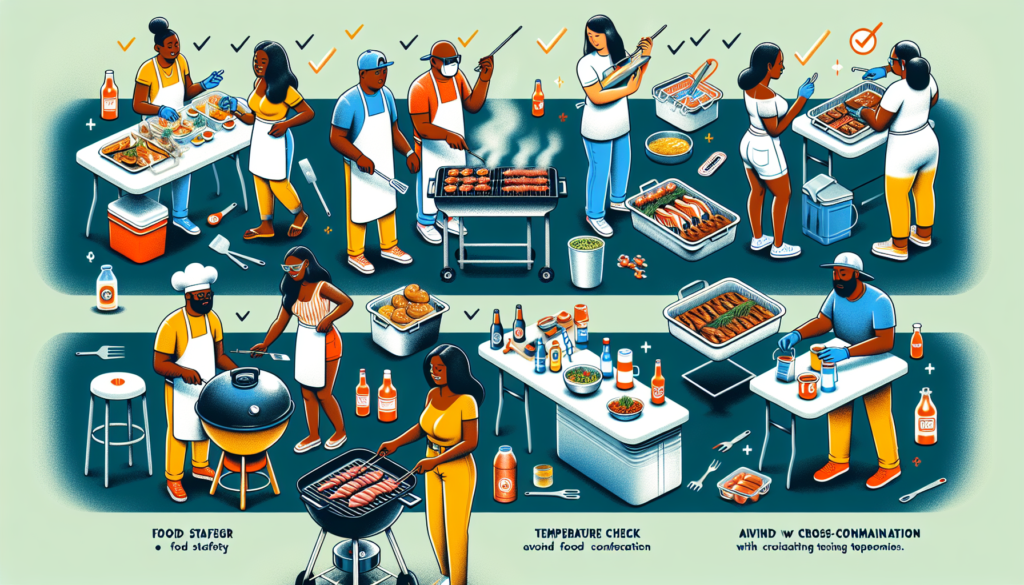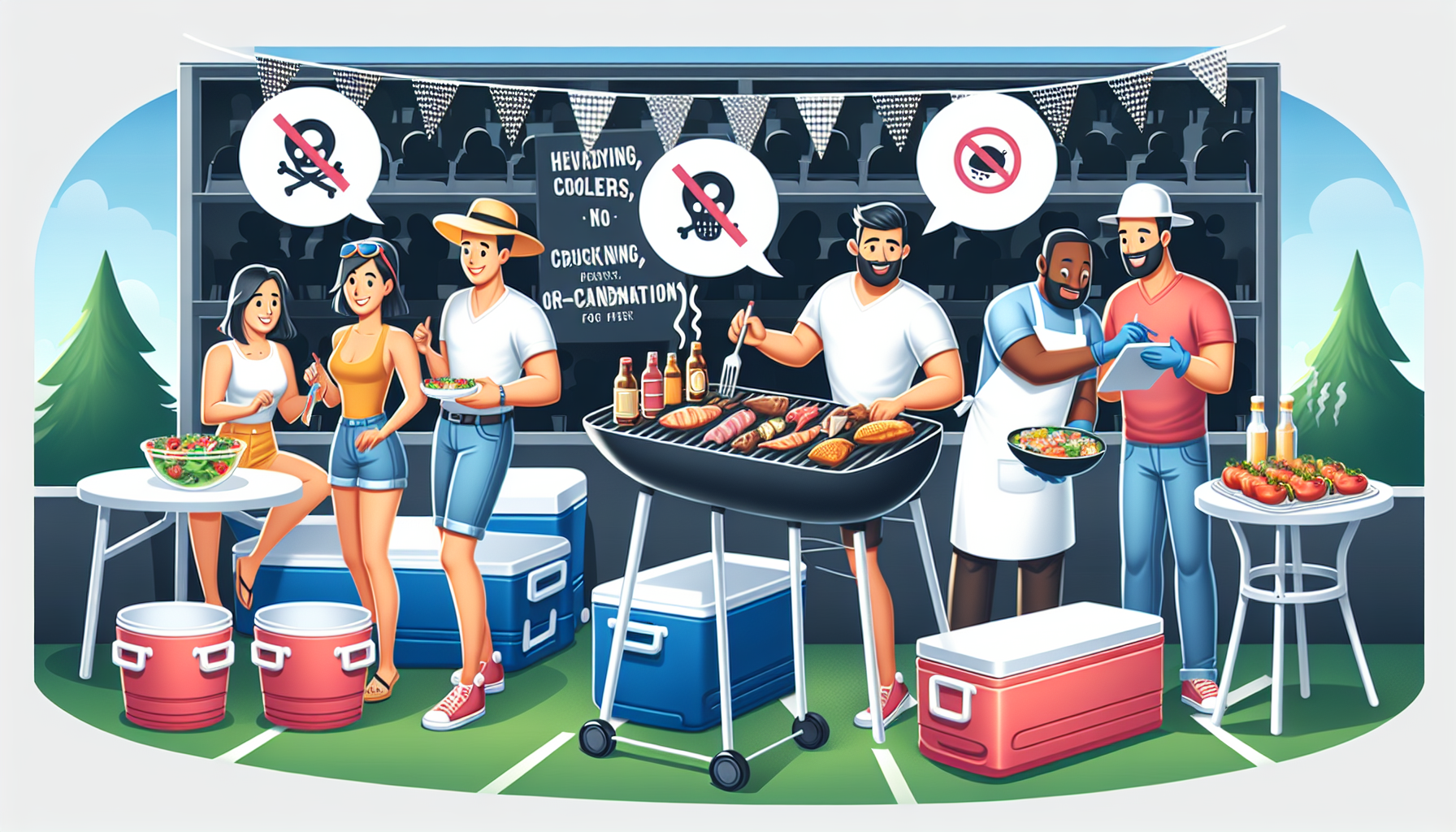Heading to a tailgating event is always an exciting time, filled with good food, great company, and cheering for your favorite team. But amidst all the fun, it’s crucial to ensure that you’re preparing your food safely to avoid any unwanted bouts of foodborne illnesses. Whether you’re a seasoned tailgating enthusiast or a newbie, this article will provide you with some valuable tips and tricks on how to prepare food safely when tailgating, so you can focus on having a fantastic time while keeping yourself and your friends and family healthy. So, grab your apron, dust off your grill, and get ready to embark on a flavorful and risk-free tailgating journey!

Proper Food Storage
When it comes to preparing food safely when tailgating, proper food storage is essential. Using coolers with sufficient ice to keep food at safe temperatures is crucial for preventing bacterial growth. Make sure to have enough ice to keep your perishable foods cold throughout the duration of your tailgate. It’s also important to separate raw and cooked foods to avoid cross-contamination. Store them in separate plastic bags or containers to prevent any potential contamination. Lastly, remember to keep the cooler closed as much as possible to maintain the cold temperature and preserve the freshness of your food.
Preparation at Home
Before you even head to the game for some tailgating fun, it’s important to prepare your food properly at home. First and foremost, always wash your hands thoroughly before handling any food. This simple step helps to reduce the risk of transferring any bacteria to the food you’re preparing. Additionally, pack your food in clean, airtight containers to prevent any outside contaminants from getting in. If you’re planning on grilling meats, consider pre-cooking and marinating them at home. This not only saves you time at the tailgate but also allows you to ensure the meat is properly cooked and flavorful. Lastly, always ensure your utensils and cutting boards are clean and free of any bacteria before using them.
Transporting the Food
Once your food is prepared and ready to be transported to the tailgate, it’s important to keep it at the appropriate temperatures. If you’re bringing hot and cold foods, make use of coolers or insulated bags. These will help to maintain the desired temperatures and prevent any foodborne illnesses. When transporting hot foods, make sure to wrap them tightly in foil and towels to help maintain their heat. It’s also crucial to place the coolers away from direct sunlight or heat sources, as this can affect the internal temperature of the food.
Grilling Safety
Grilling is often a centerpiece of tailgating, but it’s important to practice proper grilling safety to ensure the food is cooked thoroughly and safely. Before you start grilling, take a moment to ensure the grill is clean. This helps to prevent any buildup of bacteria or leftover food particles that could potentially contaminate your food. Another crucial step is to separate raw and cooked meats. Use separate utensils and cutting boards to avoid cross-contamination. To ensure your meats are cooked to a safe internal temperature, use a food thermometer. This will ensure that harmful bacteria are killed off and that the meat is safe to consume. Lastly, always keep a fire extinguisher nearby in case of any emergencies that may occur during the grilling process.

Preventing Cross-Contamination
Cross-contamination is a major concern when it comes to food safety, and it’s vital to take precautions to prevent it. One key way to prevent cross-contamination is to use separate cutting boards and utensils for raw and cooked foods. This helps to avoid any potential transfer of bacteria from raw meats to ready-to-eat foods. After handling raw meats, remember to wash your hands and surfaces thoroughly to remove any bacteria. When serving or moving cooked foods, avoid using the same platter or utensils that were used for raw meats. Lastly, be mindful not to reuse marinades that have come into contact with raw meats, as they may contain harmful bacteria.
Handling Leftovers
Handling leftovers properly is just as important as preparing and cooking the food. It’s crucial to discard any perishable foods that have been left out for more than two hours. This decreases the risk of bacterial growth and foodborne illnesses. When storing leftovers, transfer them into clean, airtight containers to preserve their freshness and prevent any cross-contamination. When reheating leftovers, ensure they are thoroughly heated to kill off any potential bacteria. Lastly, be sure to label your leftovers with the date they were cooked and store them in a cooler with ice to keep them at a safe temperature.
Proper Hygiene
Maintaining proper hygiene during tailgating is essential to prevent any possible foodborne illnesses. If water is not readily available, use hand sanitizer or disposable wipes for cleaning your hands. This will help to remove any potentially harmful bacteria from your hands. If you have any cuts or wounds, be sure to cover them with waterproof bandages to prevent any bacteria from entering your food. Avoid touching your face or hair while handling food to minimize the risk of transferring any bacteria. And if necessary, consider wearing disposable gloves to further protect against potential contamination.
Safe Drinking Practices
Food safety isn’t just about the food you eat; it also includes the beverages you consume. To ensure the safety of your drinks, bring bottled water or other sealed beverages. This helps to minimize the risk of contamination. It’s also important to avoid sharing beverages, as this can introduce bacteria from one person to another. Additionally, never drink and drive. Assign a designated driver who will abstain from alcohol consumption. Lastly, be sure to dispose of empty bottles and cans properly to maintain cleanliness and prevent any potential hazards.
Frequent Temperature Checks
Regularly checking the temperatures of your coolers and hot foods is a proactive way to ensure food safety. Keeping a food thermometer handy allows you to monitor the internal temperatures of your food and make any necessary adjustments. It’s important to be mindful of the ambient temperature as well, as hotter weather can affect the coolers and the food within them. To keep your coolers cold, consider using ice packs or frozen water bottles. These will help to maintain the desired temperature and keep your food safe to consume.
Proper Disposal of Waste
Proper disposal of waste is not only crucial for maintaining cleanliness but also for preventing pests and potential health hazards. Designate separate trash bags for food waste and non-perishable items to make disposal more efficient. Ensure that all food waste is sealed tightly to prevent attracting pests such as flies or rodents. Dispose of trash in designated bins or, if necessary, take it home with you to maintain cleanliness at the tailgating area. Lastly, take a few moments to clean the tailgating area before leaving to ensure that it’s left in a tidy and safe condition for others.
By following these guidelines and taking the necessary steps to prepare food safely when tailgating, you can enjoy your favorite foods without worrying about the risk of foodborne illnesses. Remember to prioritize proper food storage, practice good hygiene, prevent cross-contamination, monitor temperatures, and dispose of waste correctly. With these precautions in place, you can focus on cheering for your favorite team and creating lasting memories with friends and family during your tailgate festivities.
